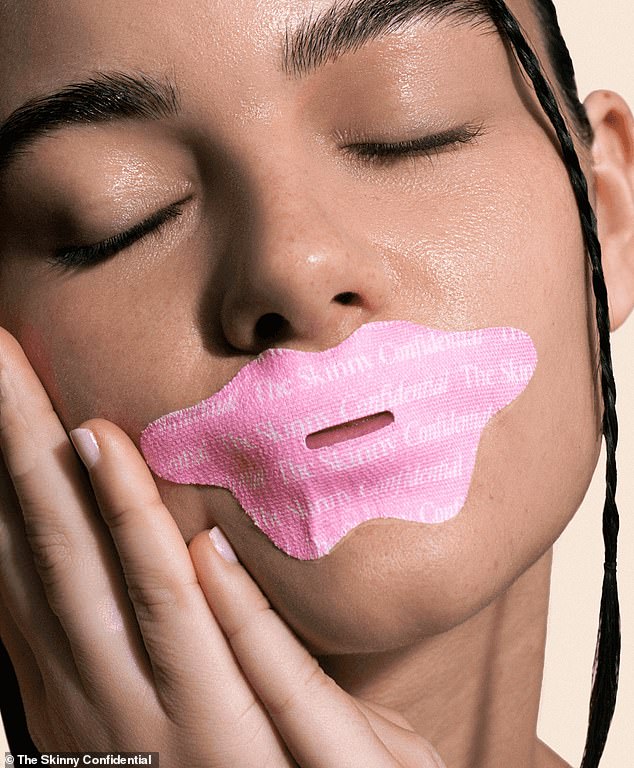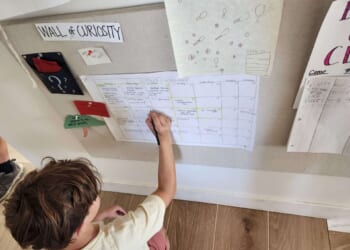We all have a nighttime skincare routine. For some, this means a pared-back routine with as few products and tools as possible, while others might take it a little bit further and wake up with more than the occasional pimple patch to peel off.
On TikTok, the phenomenon of ‘peeling off’ layers of beauty and sleep-boosting treatments that were applied the night before has been labelled the ‘morning shed’. The trend stems from the idea that ‘the uglier you go to bed, the prettier you wake up’ and has racked up hundreds of millions of views across hundreds of videos.
In most clips, people wake up in a somewhat mummified state and start their ‘shedding’ process by taking off silk eye masks, satin bonnets or heatless curlers. They then move on to remove everything from silicone face masks and chin straps to lip stains and mouth tape.
While the videos are mesmerising to watch, they have divided the Internet. Some influencers, like Devon Kelley, who is credited with coining the phrase, say the morning shed improves their sleep quality. However, experts are warning against the seemingly harmless trend, as it could be harmful.
Particularly mouth taping, which has been credited with improving snoring and sleep quality. Dr Alanna Hare, a consultant in respiratory medicine at Royal Brompton Hospital who specialises in sleep disorders, says there are no scientifically proven benefits to taping your mouth shut while sleeping. In fact, for those who have sleep apnoea and nasal obstruction, mouth taping could actually worsen sleep apnoea.
‘There is a great deal of pseudoscience and “TikTok claims” which have not been evaluated, and many of which have no biologic or physiologic rationale,’ she warns. ‘Those few controlled trials that exist have studied only very few patients.’
Hare is referring to one very small study of just 20 people with mild sleep apnoea showing mouth taping improved snoring. ‘The effects, however, are mixed,’ she says. ‘A more recent study of 66 people with obstructive sleep apnoea showed decreased airflow in people who have resorted to mouth breathing and are dependent upon it owing to nasal obstruction.’
‘I would certainly avoid this strategy if your nose is chronically blocked for any reason,’ says Hare. ‘For everyone else, I would counsel that there is very little evidence that mouth taping helps with snoring and little science or physiology to support any rationale for this approach.’
Instead, she recommends mouthguards to help with snoring as they have high quality research evidence demonstrating they are effective. ‘We recommend semi-customisable devices, rather than “boil and bite”, because they tend to stay in the mouth better and are more comfortable and longer lasting.’
Avoiding excessive alcohol and smoking is also important as these will worsen a tendency to snoring. And finally, if you have a chronically blocked nose, Hare suggests it may be worth seeing a specialist ear, nose and throat doctor as sometimes surgery can be helpful.

Mouth taping could be harmful
As for the claims that mouth taping improves the overall quality of your sleep? ‘There is no evidence to suggest this is the case and again, no physiologic rationale that it should do so,’ she explains. ‘I would not recommend this strategy to improve sleep.’
If you snore and wake frequently at night, especially if this is with gasping or choking, or others comment they hear your breathing stopping or starting at night or being irregular, Hare recommends you should see your GP asap. ‘This may represent sleep apnoea, a condition which requires medical treatment.’
For those who struggle with getting to sleep or staying asleep on a regular basis, she suggests cognitive behavioural therapy for insomnia (CBTi). ‘This can be accessed nationally without need for a referral via digital platforms such as Sleepio, Sleepful and Sleepstation.’
If you occasionally find sleep difficult, a regular bed and wake time is key, as is having time to wind down and switch off at the end of the day. ‘Avoid spending time in the bed awake at night: if it doesn’t feel as though sleep is about to return, get up and do something else, like reading or listening to a podcast or music for 20-30 minutes before returning to bed.’
Hare’s final piece of advice? ‘Avoid caffeine after about lunchtime and keep alcohol intake to a minimum as this will also disrupt sleep.’







